The most important political parties in Czechia
The party political system in Czechia remains relatively volatile. Unlike in Great Britain, where the two dominant parties have remained unchanged for over a century, most Czech political parties are still young, having emerged after the 1989 revolution. Even 35 years later, the system has yet to stabilize.
Each election brings something new—whether it’s the rise of a fresh party or a coalition formed to strengthen its chances.
Below is a short description of the 14 biggest parties according to recent opinion polls in alphabetical order. The main opinion polls are produced by STEM and Kantar.
I asked ChatGPT to compose a text with the following topics for each individual party. I also asked for the sources it took its information from.
- Parliamentary presence
- History and general politics
- Political ideology and main policies
- Description of its voters
- Perception on corruption
- Participation in government
- Recent developments
ANO (Akce nespokojených občanů) (Action of Dissatisfied Citizens)

Foto: Filip Jandourek
Seats in Parliament: ANO currently holds X seats in the 200-member Chamber of Deputies and is in opposition.
General Politics: ANO 2011 was founded in 2011 by businessman Andrej Babiš as an anti-establishment movement with a focus on business-like governance and political reform. Initially branding itself as centrist, it has since evolved into a dominant populist party in Czech politics.
Political Position: ANO is generally classified as center-right to centrist with a populist approach. The party prioritizes pragmatic governance and adjusts policies based on public sentiment rather than adhering strictly to a fixed ideology.
Voters: ANO attracts a broad voter base, including older citizens, rural voters, and individuals dissatisfied with traditional political elites. Its supporters often see it as a viable alternative to establishment parties, appreciating its focus on economic growth and state efficiency.
Policies: The party emphasizes economic stability, infrastructure development, and government efficiency. Key priorities include reducing bureaucracy, increasing pensions, tax cuts, and investing in healthcare and transportation. ANO has also adopted a moderately skeptical stance on European Union policies, particularly regarding migration and energy.
Perception on Corruption: ANO initially gained support with a strong anti-corruption platform, pledging to clean up Czech politics. However, its leader, Andrej Babiš, has faced multiple corruption allegations, including conflicts of interest and the misuse of EU funds. This has led critics to accuse the party of contradicting its original principles.
In Government: ANO was part of the government from 2014 to 2021. It first governed in coalition (2014–2017) before winning the 2017 election and leading a minority government under Babiš from 2017 to 2021. During its tenure, ANO implemented popular economic measures, such as pension increases and tax cuts. However, its government was also marred by controversies surrounding Babiš’s business interests and corruption allegations.
Recent Developments: After losing power in the 2021 elections, ANO became the main opposition party. Babiš ran for president in 2023 but lost in the second round to Petr Pavel. ANO continues to be a strong political force and is a leading contender in future elections.
KDU-ČSL (Křesťanská a demokratická unie – Československá strana lidová) (Christian and Democratic Union – Czechoslovak People's Party)
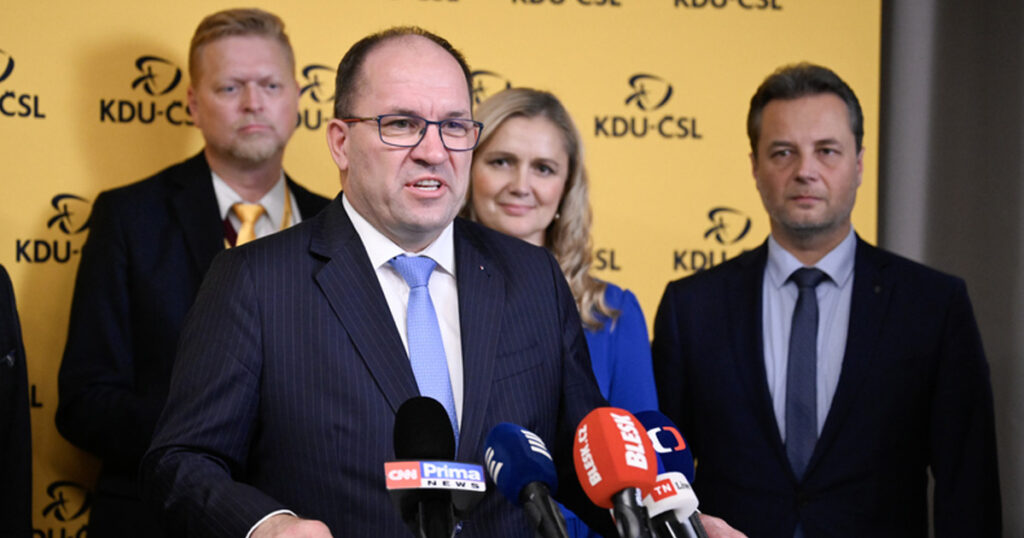
As of February 2025, the Christian and Democratic Union – Czechoslovak People’s Party (KDU-ČSL) holds 23 seats in the 200-member Chamber of Deputies of the Czech Parliament.
General Politics: Established in 1919, KDU-ČSL is one of the oldest political parties in the Czech Republic. It has its roots in Christian democracy and has been a consistent advocate for integrating Christian values into public policy. The party emphasizes tradition, family values, and social responsibility.
Political Position: KDU-ČSL is positioned as a centrist party, promoting Christian democracy, green conservatism, and social conservatism. It supports the principles of a social market economy, environmental stewardship, and the protection of human rights. The party is a member of the European People’s Party and aligns itself with pro-European Union policies.
Voters: The party’s electorate primarily consists of individuals who value Christian ethics, family-oriented policies, and community cohesion. It garners support from both rural and urban populations, particularly among those who prioritize social conservatism and environmental issues.
Policies: KDU-ČSL advocates for policies that strengthen family structures, support sustainable development, and uphold social justice. The party emphasizes the importance of education, healthcare, and social services, aiming to create a balanced approach between economic growth and social welfare. It also supports environmental conservation initiatives, reflecting its commitment to green conservatism.
Perception on Corruption: KDU-ČSL has maintained a reputation for promoting ethical governance and transparency. The party has historically advocated for anti-corruption measures and has been involved in initiatives aimed at increasing accountability within public institutions.
In Government: KDU-ČSL has been a frequent participant in Czech coalition governments since 1990. In the 2021 parliamentary elections, the party was part of the SPOLU alliance, alongside the Civic Democratic Party (ODS) and TOP 09. The alliance won the election, leading to the formation of the Cabinet of Petr Fiala, in which KDU-ČSL played a significant role.
Recent Developments: In 2024, internal discussions within KDU-ČSL led to a leadership election. Marian Jurečka, who had been leading the party since 2020, faced challenges due to unmet objectives in the European Parliament elections. Marek Výborný was elected as the new party leader, signaling a potential shift in strategy and renewed focus on the party’s core values.
Overall, KDU-ČSL continues to be a significant centrist force in Czech politics, advocating for policies that integrate Christian democratic principles with contemporary social and environmental concerns.
Motoristé (Motoristé sobě) (Motorists for Themselves)
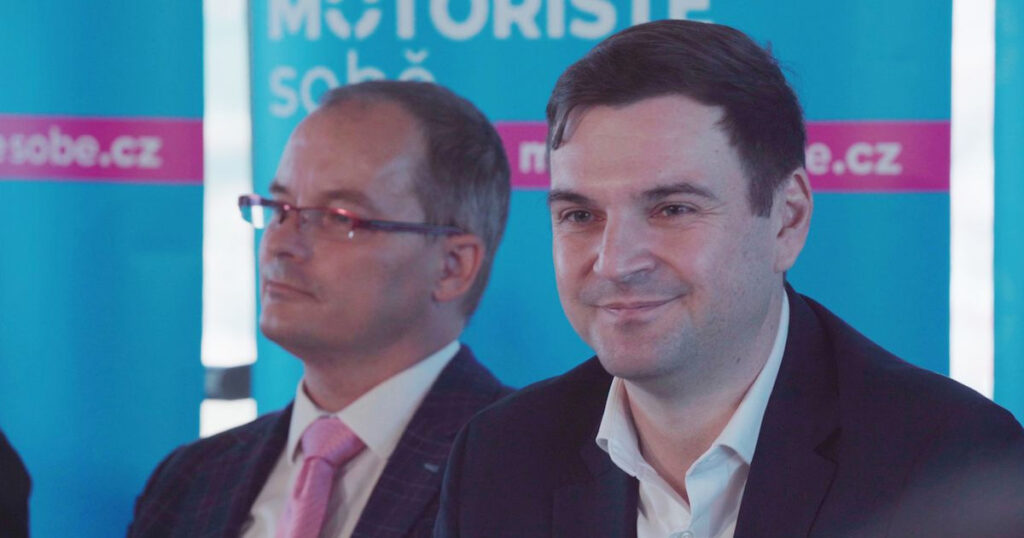
As of February 2025, Motorists for Themselves (Motoristé sobě) does not hold any seats in the 200-member Chamber of Deputies of the Czech Parliament. However, the party has gained attention through its participation in various elections and its advocacy for motorists’ interests.
General Politics: Founded in 2022, Motorists for Themselves is a Czech political party that emerged to represent the interests of drivers and to counter policies perceived as unfavorable to motorists. The party positions itself against green politics, liberalism, and progressivism, advocating for policies that support car usage and oppose environmental regulations that restrict motorists.
Political Position: The party is identified with right-wing populism and national conservatism. It emphasizes national sovereignty and expresses Euroscepticism, opposing certain European Union policies, particularly those related to environmental regulations and the adoption of the euro.
Voters: Motorists for Themselves appeals to voters who prioritize personal vehicle use and are critical of environmental policies that they perceive as limiting their mobility. The party’s support base includes individuals concerned about the impact of green policies on their daily lives and those skeptical of the European Union’s influence on national policies.
Policies: The party advocates for the removal of bicycle lanes, supports the use of coal and nuclear energy, and opposes the European Green Deal. It also stands against the adoption of the euro and promotes a free-market economy. The party’s slogan, “cars, coal, and the crown,” encapsulates its focus on motorists’ interests, traditional energy sources, and national currency.
Perception on Corruption: While specific positions on corruption are not prominently featured in the party’s platform, its advocacy for transparent governance and opposition to certain EU policies suggest a stance favoring national control and accountability.
In Government: Motorists for Themselves has not held governmental positions at the national level. In the 2022 Prague municipal elections, the party received 2.29% of the vote, failing to cross the 5% threshold required for representation. In the 2024 European Parliament elections, the party formed a coalition with Přísaha, securing 10.26% of the vote and winning two seats. The coalition’s success was notable, though it faced controversy due to the display of Nazi symbols by its leader, Filip Turek.
Recent Developments: In early 2025, the party announced its intention to contest the Czech parliamentary elections independently, following a membership vote favoring this approach. Party chairperson Petr Macinka welcomed the decision, emphasizing the importance of maintaining ideological purity. The party has not ruled out offering spots on its lists to members of other minor parties, such as Svobodní, and aims to continue its cooperation with Přísaha’s Robert Šlachta. Recent opinion polls indicate that Motorists for Themselves has begun to cross the 5% electoral threshold, suggesting growing support.
Overall, Motorists for Themselves is a relatively new political entity in the Czech Republic, focusing on motorists’ interests and expressing skepticism toward environmental regulations and certain EU policies. The party has gained attention through its electoral participation and advocacy, positioning itself as a voice for drivers and those critical of green policies.
ODS (Občanská demokratická strana) (Civic Democratic Party)
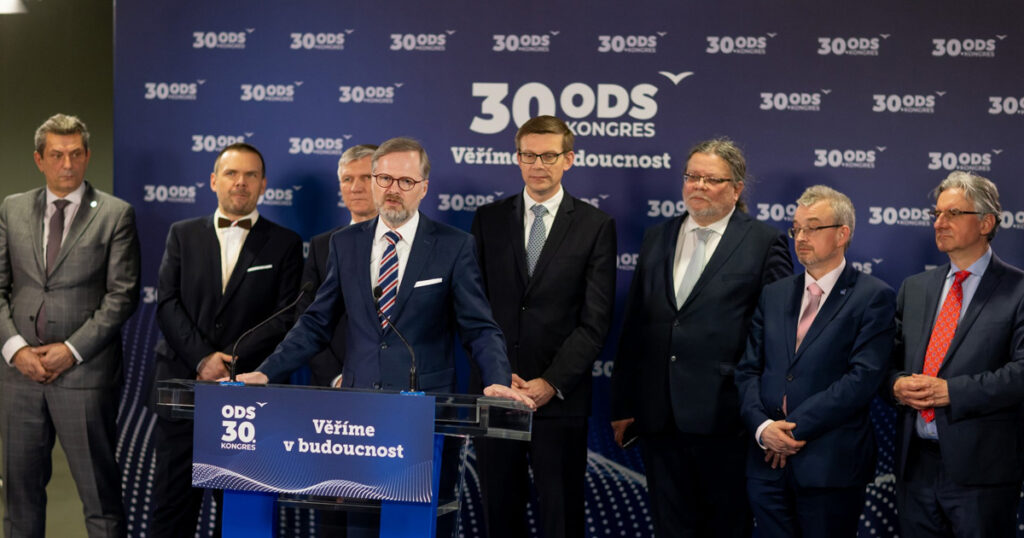
Seats in Parliament: As of February 2025, the Civic Democratic Party (Občanská demokratická strana, ODS) holds 34 seats in the 200-member Chamber of Deputies. ODS is the leading party in the SPOLU alliance, a center-right coalition formed with the Christian and Democratic Union – Czechoslovak People’s Party (KDU-ČSL) and TOP 09. The alliance collectively won 71 seats in the 2021 parliamentary elections and continues to play a major role in government.
General Politics: Established in 1991 by Václav Klaus, ODS emerged from the Civic Forum as a pro–free market, center-right political entity. The party has been a dominant presence in Czech politics, participating in multiple governing coalitions since its inception. Since 2021, ODS has been the driving force behind SPOLU, which was formed to consolidate center-right support against populist and left-wing parties.
Political Position: ODS is identified with conservatism and economic liberalism, advocating for free-market policies and limited government intervention. It is a member of the European Conservatives and Reformists Party, reflecting its center-right to right-wing orientation. Through SPOLU, ODS has worked to unify the Czech center-right, presenting itself as a pro-Western, fiscally responsible alternative to populist movements.
Voters: The party’s support base includes individuals favoring conservative values, free-market principles, and a pro-European stance. Its electorate spans various demographics, including professionals, business owners, and citizens advocating for fiscal conservatism. The broader SPOLU coalition has helped ODS attract centrist and Christian-democratic voters who might not otherwise support the party.
Policies: ODS emphasizes economic liberalism, advocating for tax reductions, deregulation, and policies that stimulate private enterprise. The party also supports strengthening national defense and maintaining a firm stance within the European Union. As part of SPOLU, ODS has promoted stability, NATO cooperation, and strong economic policies while balancing the interests of its coalition partners.
Perception on Corruption: Throughout its history, ODS has faced corruption allegations, notably during the 1990s and 2000s, which have impacted its public image. The party has since implemented measures to address these issues and restore public trust. SPOLU’s formation was also seen as a way to promote a more transparent and stable center-right government.
In Government: ODS has been a key player in Czech politics, leading governments in the 1990s and 2000s. Under the leadership of Petr Fiala, who has been Prime Minister since 2021, the party has focused on economic reforms, strengthening international alliances, and supporting Ukraine amidst regional tensions. As the dominant force within SPOLU, ODS has played a central role in shaping government policy, particularly in economic management and foreign affairs.
Recent Developments: In recent years, ODS has maintained its influence, participating in governing coalitions and holding significant positions within the government. SPOLU’s success in regional and Senate elections has reinforced ODS’s leadership in Czech center-right politics, positioning the coalition as a major counterweight to ANO and other opposition parties.
Piráti (Česká pirátská strana) (Czech Pirate Party)
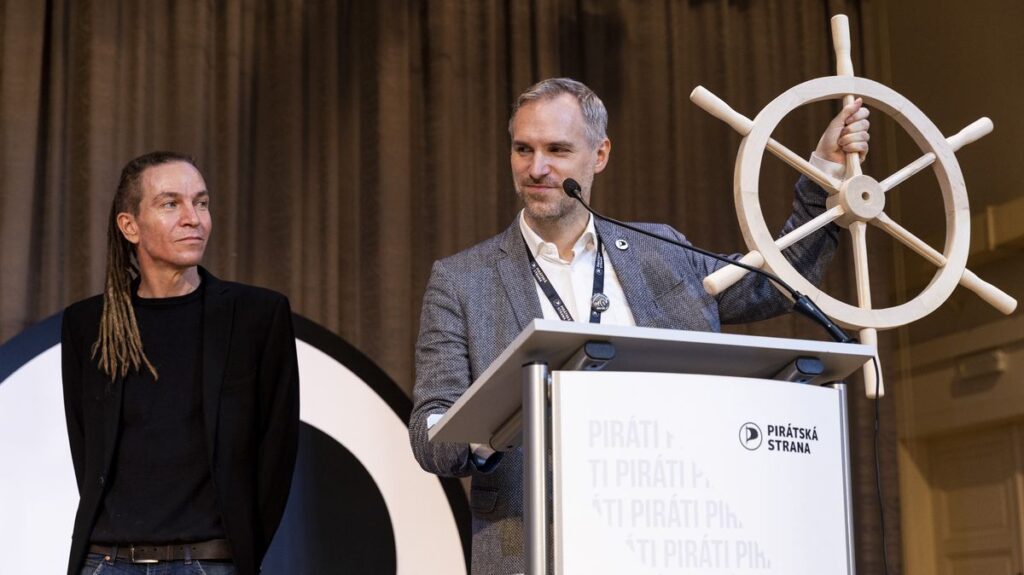
Foto: Seznam Zprávy
As of February 2025, the Czech Pirate Party (Česká pirátská strana, Piráti) holds 4 seats in the 200-member Chamber of Deputies, following the 2021 parliamentary elections where they ran in coalition with the Mayors and Independents (STAN) party.
General Politics: Founded in 2009, the Czech Pirate Party is part of the international Pirate movement, emphasizing transparency, civil rights, and direct democracy. Under the leadership of Ivan Bartoš, the party has grown from a minor political group to a significant player in Czech politics, participating in various levels of government, including the national parliament, European Parliament, and municipal assemblies.
Political Position: The party is generally considered center-left, advocating for progressive policies such as government transparency, digital rights, and participatory democracy. It supports civil liberties, environmental sustainability, and social justice, aligning with other progressive movements in Europe.
Voters: The Czech Pirate Party appeals to younger, urban voters who prioritize digital rights, government transparency, and progressive social policies. Its supporters often include professionals, students, and individuals engaged in the tech industry, reflecting the party’s focus on digitalization and innovation.
Policies: The party’s platform includes promoting open government, protecting privacy rights, and implementing direct democracy mechanisms. It advocates for the digitalization of public services, environmental sustainability, and social equality. In the European Parliament, the party’s MEPs are part of the Greens-European Free Alliance group, reflecting their commitment to environmental issues and progressive policies.
Perception on Corruption: The Czech Pirate Party has built its reputation on anti-corruption efforts, emphasizing transparency and accountability in government. Its commitment to open data and participatory governance is seen as a countermeasure to entrenched political corruption, appealing to voters dissatisfied with traditional parties.
In Government: In the 2021 parliamentary elections, the Pirates formed a coalition with the Mayors and Independents (STAN), securing a total of 37 seats, of which 4 were held by Pirate MPs. The coalition joined the governing Cabinet of Petr Fiala, with Ivan Bartoš serving as the Minister for Regional Development. However, in October 2024, following internal disagreements and the dismissal of Bartoš from his ministerial position, the Pirates decided to leave the coalition government.
Recent Developments: After exiting the government in late 2024, the Czech Pirate Party has been focusing on rebuilding its support base and preparing for upcoming elections. The party continues to advocate for its core principles of transparency, digital rights, and participatory democracy, aiming to regain the trust of voters and strengthen its position in Czech politics.
Overall, the Czech Pirate Party remains a significant force in Czech politics, advocating for progressive policies and government transparency, while navigating the challenges of coalition politics and internal dynamics.
Přísaha
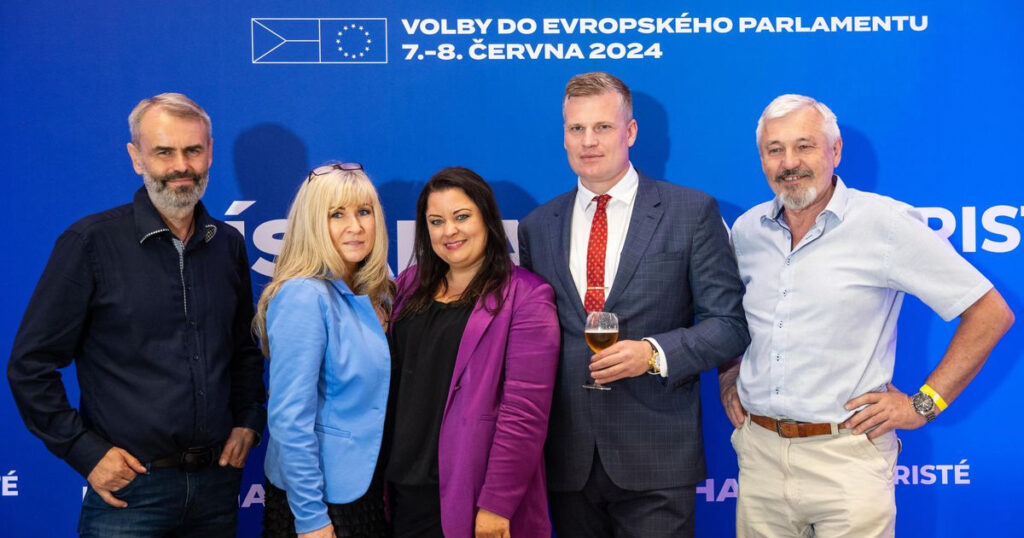
Foto: Renata Matějková, Seznam Zprávy
Seats in Parliament: As of February 2025, Přísaha does not hold any seats in the 200-member Chamber of Deputies of the Czech Parliament. However, the party has gained attention through its participation in various elections and its advocacy against corruption.
General Politics: Přísaha, officially known as the Přísaha Civic Movement (Přísaha občanské hnutí), is a political party in the Czech Republic founded in January 2021 by Robert Šlachta, a former high-ranking police officer known for his role in investigating political corruption scandals. The party was established with a focus on combating corruption and promoting transparency in government.
Political Position: Přísaha is identified as a right-wing populist and Eurosceptic party. It emphasizes national sovereignty and expresses skepticism towards the European Union, advocating for policies that prioritize the interests of Czech citizens.
Voters: The party appeals to voters who are dissatisfied with traditional political elites and are concerned about corruption within the government. Its support base includes individuals seeking greater accountability and transparency in politics.
Policies: Přísaha’s platform centers on anti-corruption measures, including strengthening the independence of the judiciary and law enforcement agencies. The party also advocates for transparent governance and policies that enhance public trust in political institutions.
Perception on Corruption: Given its foundation by a former police officer known for anti-corruption investigations, Přísaha positions itself as a staunch opponent of corruption. The party’s initiatives are aimed at increasing accountability within public institutions and reducing corrupt practices.
In Government: Přísaha has not held governmental positions at the national level. In the 2021 general election, the party received 4.68% of the vote, falling short of the 5% threshold required for representation in the Chamber of Deputies. In the 2024 European Parliament elections, Přísaha formed a coalition with Motorists for Themselves, securing 10.26% of the vote and winning seats in the European Parliament.
Recent Developments: In early 2025, Přísaha announced its intention to contest the upcoming Czech parliamentary elections independently, following a membership vote favoring this approach. Party leader Robert Šlachta emphasized the importance of maintaining ideological purity. The party has not ruled out offering spots on its lists to members of other minor parties and aims to continue its cooperation with Motorists for Themselves. Recent opinion polls indicate that Přísaha has begun to cross the 5% electoral threshold, suggesting growing support.
Overall, Přísaha is a relatively new political entity in the Czech Republic, focusing on anti-corruption efforts and transparent governance. The party has gained attention through its electoral participation and advocacy, positioning itself as a voice for citizens seeking accountability in politics.
SocDem (CSSD)
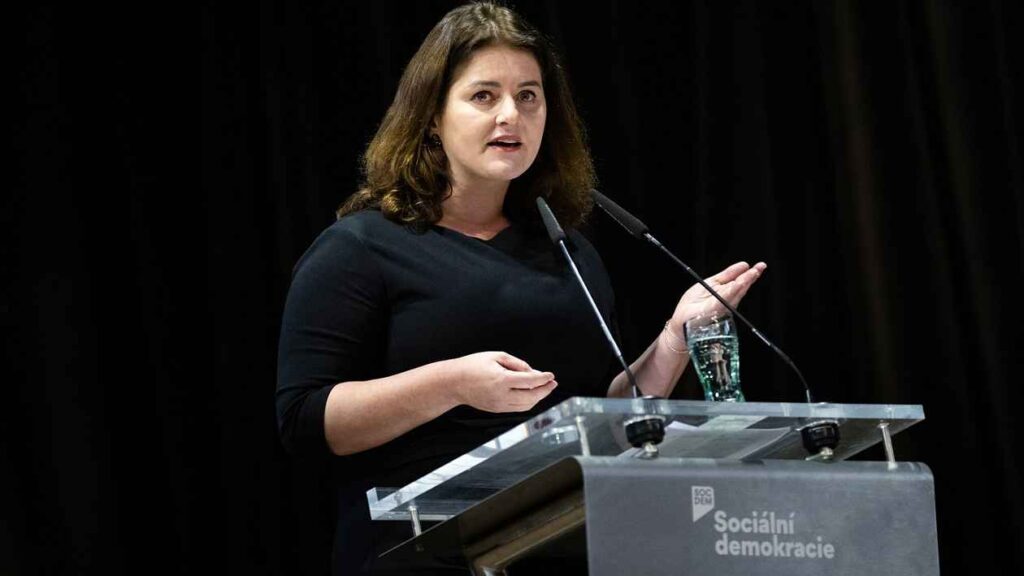
Foto: ČTK
Seats in Parliament: As of February 2025, Social Democracy (Sociální demokracie, SOCDEM), formerly known as the Czech Social Democratic Party (Česká strana sociálně demokratická, ČSSD), does not hold any seats in the 200-member Chamber of Deputies of the Czech Parliament. The party lost its parliamentary representation following the 2021 elections and has since been striving to regain its position in Czech politics.
General Politics: Founded in 1878, SOCDEM is one of the oldest political parties in the Czech Republic, with a long-standing tradition of advocating for social democratic principles. Throughout its history, the party has played a significant role in shaping the country’s political landscape, particularly during the early years of Czechoslovakia and after the Velvet Revolution. In June 2023, the party officially rebranded itself as Social Democracy (SOCDEM) in an effort to modernize its image and appeal to a broader electorate.
Political Position: SOCDEM positions itself on the center-left of the political spectrum, advocating for social justice, workers’ rights, and progressive taxation. The party is pro-European and is a member of international organizations such as the Party of European Socialists, the Socialist International, and the Progressive Alliance.
Voters: Traditionally, SOCDEM has garnered support from working-class citizens, public sector employees, and individuals residing in industrial regions. However, in recent years, the party has faced challenges in maintaining its traditional voter base, leading to a decline in electoral support.
Policies: The party’s platform emphasizes social welfare programs, including accessible healthcare, education, and housing. SOCDEM advocates for progressive taxation to fund public services and supports policies aimed at reducing income inequality. The party also emphasizes the importance of environmental sustainability and workers’ rights.
Perception on Corruption: SOCDEM has historically advocated for transparent governance and anti-corruption measures. However, like many long-standing political parties, it has faced criticism and scrutiny over various scandals involving party members, which have affected its public image.
In Government: SOCDEM has been a significant player in Czech politics, leading several governments and participating in various coalitions. Notably, the party led the government from 1998 to 2006 and again from 2014 to 2017. In the 2021 parliamentary elections, SOCDEM received only 4.65% of the vote, failing to meet the 5% threshold required for representation in the Chamber of Deputies, resulting in the loss of all its parliamentary seats.
Recent Developments: Following the electoral defeat in 2021, Jan Hamáček resigned as party leader, and Michal Šmarda was elected as his successor. In June 2023, under Šmarda’s leadership, the party rebranded itself as Social Democracy (SOCDEM). After the 2024 European Parliament elections, Šmarda announced a leadership election for October 2024. He subsequently resigned following poor results in the 2024 regional elections, suggesting that the party should be led by someone who had succeeded in those elections. Jana Maláčová, former Minister of Labour and Social Affairs, was elected as the new party leader in October 2024. She has expressed intentions to build a broad left-wing coalition ahead of the general elections.
Overall, SOCDEM is a party with a rich history in Czech politics, currently undergoing a period of transformation and renewal as it seeks to regain its influence and reconnect with its traditional voter base.
SPD (Svoboda a přímá demokracie) (Freedom and Direct Democracy)
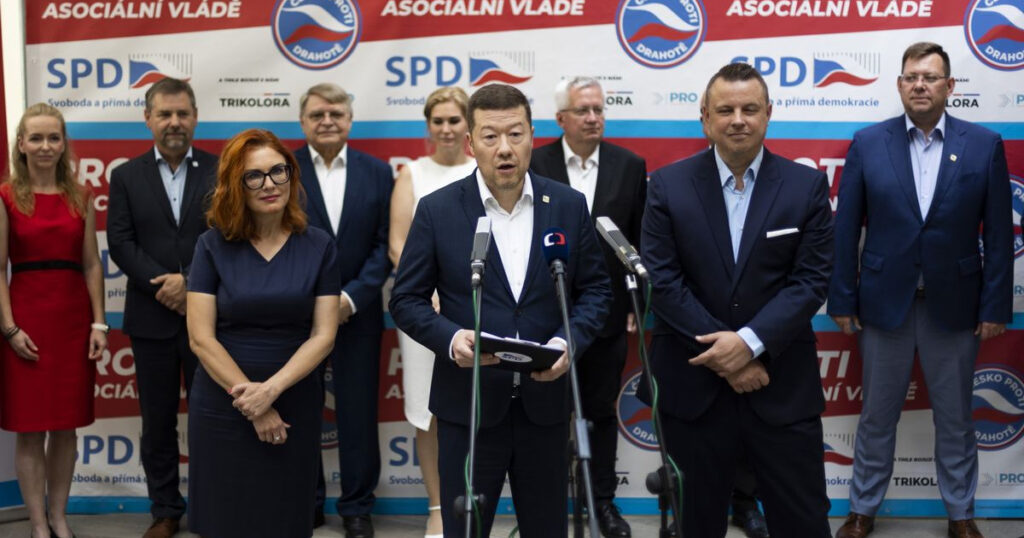
Foto: Michal Turek, Seznam Zprávy
Seats in Parliament: As of February 2025, Freedom and Direct Democracy (Svoboda a přímá demokracie, SPD) holds 20 seats in the 200-member Chamber of Deputies, making it a notable presence in the Czech Parliament.
General Politics: Founded in May 2015 by Tomio Okamura and Radim Fiala, SPD emerged from a split within the Dawn of Direct Democracy parliamentary group. The party positions itself as anti-establishment, emphasizing direct democracy and national sovereignty.
Political Position: SPD is characterized as a right-wing to far-right party, advocating for right-wing populism, nationalism, anti-immigration policies, and hard Euroscepticism. The party also emphasizes direct democracy, seeking to increase citizen participation in political decision-making.
Voters: SPD attracts voters who are critical of immigration, skeptical of the European Union, and supportive of increased direct democratic mechanisms. Its base includes individuals concerned about national identity and sovereignty, as well as those dissatisfied with traditional political elites.
Policies: The party’s platform includes strong opposition to immigration, particularly from Muslim-majority countries, and a hardline stance against EU integration, advocating for national sovereignty over EU directives. SPD also promotes the implementation of direct democracy tools, such as referendums, to empower citizens in the legislative process.
Perception on Corruption: SPD positions itself as an anti-elitist party, criticizing established political structures and elites. While it emphasizes transparency and accountability, the party has faced scrutiny over its associations and the backgrounds of some of its members.
In Government: SPD has not been part of any governing coalition at the national level. However, it has maintained a vocal presence in the Chamber of Deputies, influencing debates on immigration, EU relations, and national sovereignty. The party has also established connections with other far-right parties in Europe, participating in international conferences and alliances.
Recent Developments: In June 2024, SPD announced its departure from the Identity and Democracy group in the European Parliament to join a new alliance called “Europe of Sovereign Nations,” led by Germany’s Alternative for Germany (AfD). This move reflects SPD’s ongoing efforts to collaborate with like-minded parties across Europe to promote national sovereignty and oppose further EU integration.
Overall, SPD continues to advocate for national sovereignty, direct democracy, and stringent immigration controls, maintaining its role as a significant and controversial player in Czech politics.
Stačilo / KSČM

Foto: Michaela Rambousková, Seznam Zprávy
Seats in Parliament: As of February 2025, the Communist Party of Bohemia and Moravia (KSČM) does not hold any seats in the 200-member Chamber of Deputies of the Czech Parliament, having lost its representation following the 2021 elections. In December 2023, KSČM formed the electoral alliance “Stačilo!” (“Enough!”) in collaboration with other parties and independents.
General Politics: KSČM, established in 1990 as the successor to the Communist Party of Czechoslovakia, is a communist party in the Czech Republic. In December 2023, under the leadership of Kateřina Konečná, KSČM announced the formation of the “Stačilo!” coalition, which includes the United Democrats – Association of Independents, the Czech National Social Party, and independent individuals.
Political Position: KSČM is positioned on the left-wing to far-left of the political spectrum, advocating for communism and Marxism. The “Stačilo!” coalition describes itself as “left-wing and patriotic” and has been characterized as eurosceptic and anti-system.
Voters: KSČM traditionally appeals to older voters with nostalgic views of the pre-1989 era, as well as individuals in rural areas and those dissatisfied with the current political system. The “Stačilo!” coalition aims to broaden this base by attracting voters from both the left and the far-right who are critical of the European Union and mainstream politics.
Policies: KSČM’s platform emphasizes anti-capitalism, social justice, and national sovereignty. The “Stačilo!” coalition has prioritized the abolition of the European Green Deal, opposition to the EU-wide ban on combustion engine cars, cessation of weapon deliveries to Ukraine, equalization of salaries across the EU, removal of sanctions against Russia and Belarus, and the purchase of Russian natural gas by EU countries.
Perception on Corruption: KSČM has historically advocated for transparent governance and anti-corruption measures. However, its association with the former communist regime has led to ongoing debates about its role in past political practices. The “Stačilo!” coalition includes individuals accused of spreading disinformation during the COVID-19 pandemic, which has raised concerns about its commitment to transparency.
In Government: KSČM has never been part of a governing coalition at the national level but has provided parliamentary support to other governments, such as Andrej Babiš’s second cabinet until April 2021. The “Stačilo!” coalition participated in the 2024 European Parliament elections, securing 9.56% of the vote and gaining representation.
Recent Developments: In January 2025, internal discussions within the “Stačilo!” coalition highlighted tensions regarding the inclusion of certain candidates and the coalition’s direction. Despite these challenges, the coalition continues to position itself as a significant opposition force in Czech politics.
Overall, KSČM, through the “Stačilo!” coalition, is attempting to revitalize its political influence by forming alliances and appealing to a broader spectrum of voters dissatisfied with the current political establishment.
STAN (Starostové a nezávislí) (Mayors and Independents)

Foto: Twitter @Vit_Rakusan
Seats in Parliament: As of February 2025, the Mayors and Independents (Starostové a nezávislí, STAN) party holds 33 seats in the 200-member Chamber of Deputies, positioning it as a significant force in the Czech Parliament.
General Politics: Established in 2004 as Independent Mayors for the Region (Nezávislí starostové pro kraj, NSK), STAN transformed into its current form in 2009. The party focuses on localism, promoting community involvement at municipal and regional levels. Under the leadership of Vít Rakušan, who also serves as the Minister of the Interior, STAN has expanded its representation in both chambers of the Czech Parliament and the European Parliament.
Political Position: STAN is identified with liberalism, localism, and pro-Europeanism. The party emphasizes decentralization, reduced bureaucracy, and anti-corruption measures, advocating for decisions to be made at the most immediate level consistent with their resolution.
Voters: STAN’s support base includes individuals who prioritize local governance, community engagement, and European integration. The party appeals to voters seeking pragmatic solutions to regional issues and those dissatisfied with centralized political structures.
Policies: The party promotes European integration, improvements to education, and investment in science.
Perception on Corruption: STAN has maintained a focus on anti-corruption measures, advocating for transparency and accountability in government. The party’s emphasis on localism and community involvement is seen as a strategy to reduce opportunities for corruption by bringing governance closer to citizens.
In Government: In the 2021 parliamentary elections, STAN formed the Pirates and Mayors coalition with the Czech Pirate Party, securing a significant number of seats in the Chamber of Deputies. Following the elections, STAN became part of the governing coalition, with Vít Rakušan appointed as the Minister of the Interior. The party has focused on decentralization, education reform, and strengthening regional development.
Recent Developments: In preparation for the 2024 European Parliament elections, STAN explored a new alliance with the Renew Europe group, aiming to strengthen its pro-European stance and influence within the EU. The party’s campaign emphasized economic competitiveness, climate change mitigation, and reducing bureaucracy within the European Union.
Overall, STAN continues to advocate for localism, liberalism, and pro-European policies, maintaining its role as a significant player in Czech politics.
Svobodní (Free (wo)men)
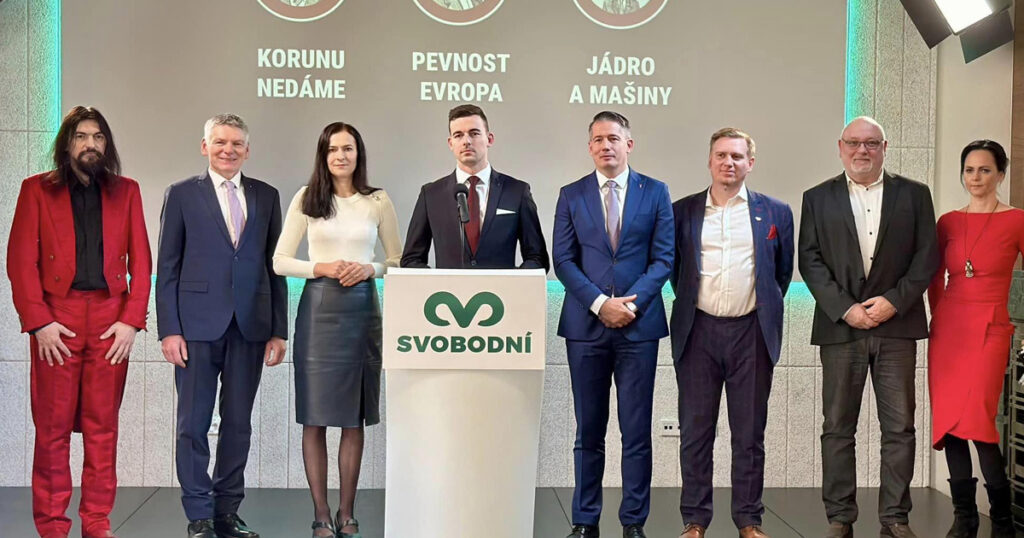
Foto: Svobodni
Seats in Parliament: As of February 2025, the Svobodní party does not hold any seats in the 200-member Chamber of Deputies of the Czech Parliament. However, the party maintains a presence in local politics, with representation in various municipal councils.
General Politics: Svobodní, officially known as the Free Citizens’ Party (Strana svobodných občanů), was founded on February 14, 2009, by economist Petr Mach. The party emerged as a split from the Civic Democratic Party (ODS), positioning itself as a proponent of classical liberalism and right-libertarianism. Svobodní advocates for minimal state intervention, individual liberties, and a free-market economy. The party is currently led by Libor Vondráček.
Political Position: Svobodní is situated on the right-wing of the political spectrum, promoting classical liberal and libertarian conservative ideologies. The party is known for its strong Eurosceptic stance, advocating for national sovereignty and expressing criticism towards the European Union’s policies.
Voters: The party appeals to voters who favor limited government intervention, free-market principles, and individual freedoms. Its supporters often include entrepreneurs, professionals, and individuals skeptical of centralized political power, particularly that of the European Union.
Policies: Svobodní’s platform emphasizes reducing taxation and government spending, promoting deregulation, and protecting individual liberties. The party advocates for the Czech Republic to remain in the European Union only if significant reforms are achieved; otherwise, it supports the idea of exiting the EU.
Perception on Corruption: Svobodní positions itself as a proponent of transparent governance and reducing opportunities for corruption through minimizing government intervention. The party believes that downsizing the government would leave less opportunity for corruption, a problematic issue in Czech politics.
In Government: Svobodní has not been part of the national government but has achieved representation at the local level. In the 2014 local elections, the party increased its number of councilors, securing positions in city districts such as Prague 3, Prague 18, and Brno-Slatina, as well as in towns like Chrudim, Hodonín, and Kutná Hora.
Recent Developments: In the 2024 European Parliament elections, Svobodní, under the leadership of Libor Vondráček, received 1.76% of the vote, which was insufficient to secure a seat. The party continues to advocate for its principles of individual liberty and limited government, seeking to expand its influence in Czech politics.
Overall, Svobodní remains a party committed to classical liberal values, striving to promote individual freedoms and a free-market economy within the Czech Republic.
TOP09 (Tradice Odpovědnost Prosperita 09) (Tradition, Responsibility, Prosperity 09)
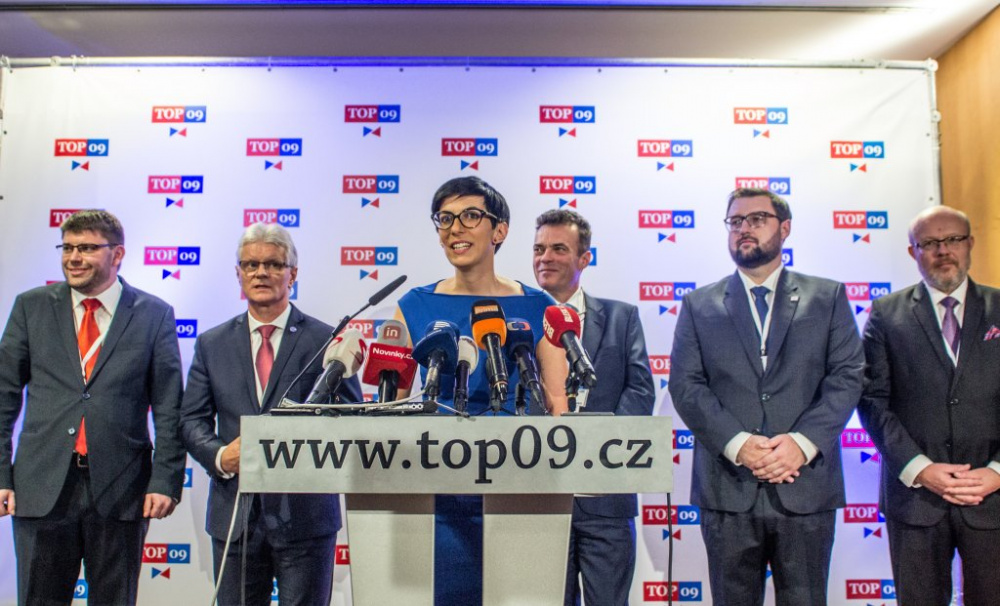
Foto: TOP09
As of February 2025, TOP 09 holds 14 seats in the 200-member Chamber of Deputies of the Czech Parliament.
General Politics: Founded on June 11, 2009, by Miroslav Kalousek and Karel Schwarzenberg, TOP 09 emerged as a liberal-conservative political party emphasizing tradition, responsibility, and prosperity. The party has been a strong advocate for European integration and has positioned itself as a pro-European force in Czech politics.
Political Position: TOP 09 is identified as a center-right party, promoting liberal conservatism, liberalism, and Christian democracy. It emphasizes the rule of law, individual freedoms, and a free-market economy. The party is affiliated with the European People’s Party and is known for its pro-European stance.
Voters: The party appeals to voters who value conservative principles, economic liberalism, and European integration. Its support base includes individuals who prioritize fiscal responsibility, democratic values, and active participation in the European Union.
Policies: TOP 09 advocates for fiscal conservatism, emphasizing balanced budgets and responsible economic policies. The party supports European integration, aiming to strengthen the Czech Republic’s role within the EU. It also focuses on education, science, and research, recognizing their importance in fostering innovation and economic growth.
Perception on Corruption: TOP 09 positions itself as a proponent of transparency and accountability in government. The party has advocated for measures to combat corruption and promote ethical governance, aligning with its emphasis on the rule of law and democratic principles.
In Government: TOP 09 has been part of various governing coalitions since its inception. In the 2021 parliamentary elections, the party joined the SPOLU coalition alongside the Civic Democratic Party (ODS) and the Christian and Democratic Union – Czechoslovak People’s Party (KDU-ČSL). The coalition secured a significant number of seats, leading to its participation in the government under Prime Minister Petr Fiala. Markéta Pekarová Adamová, the leader of TOP 09, has played a prominent role in the coalition, contributing to policy discussions and legislative initiatives.
Recent Developments: In recent years, TOP 09 has continued to advocate for its core principles, focusing on strengthening the Czech Republic’s position within the European Union and promoting policies that support economic growth and social responsibility. The party has also been active in addressing contemporary challenges, such as climate change and digitalization, proposing solutions that align with its liberal-conservative ideology.
Overall, TOP 09 remains a significant center-right political force in the Czech Republic, committed to promoting liberal-conservative values, fiscal responsibility, and active engagement in European affairs.
Trikolora (Three color)
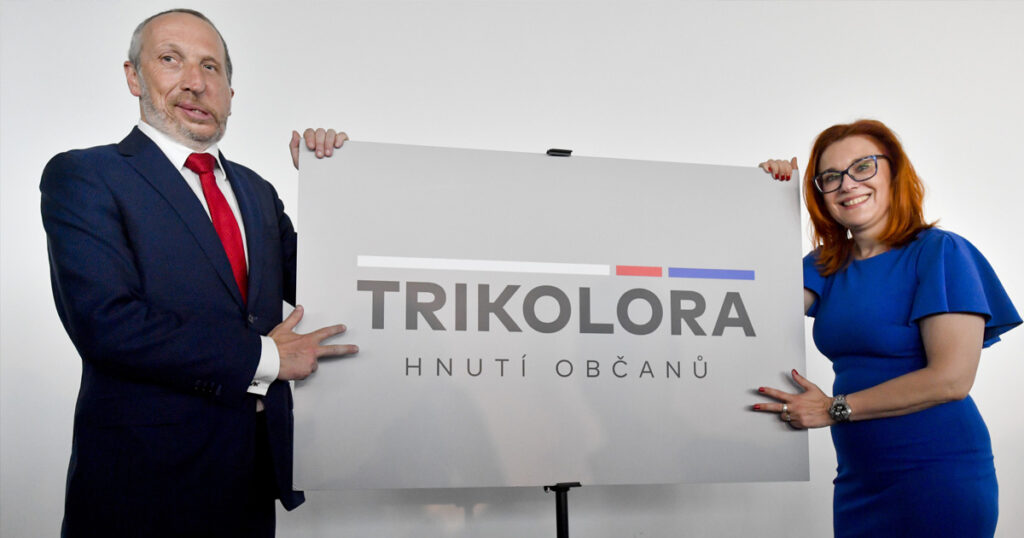
Foto: Vít Šimánek, ČTK
Seats in Parliament: As of February 2025, Trikolora does not hold any seats in the 200-member Chamber of Deputies of the Czech Parliament. The party maintains a presence in local politics, with representation in various municipal councils.
General Politics: Trikolora, officially known as the Tricolour Citizens’ Movement (Trikolóra hnutí občanů), was founded on June 25, 2019, by Václav Klaus Jr., a former member of the Chamber of Deputies who was expelled from the Civic Democratic Party (ODS) in March 2019. The party positions itself as a hard Eurosceptic, fiscally conservative, and national-conservative political entity. Václav Klaus Sr., former President and Prime Minister of the Czech Republic, serves as the party’s chief foreign policy adviser.
Political Position: Trikolora is situated on the right-wing to far-right of the political spectrum, promoting national sovereignty, traditional values, and a free-market economy. The party is known for its strong Eurosceptic stance, advocating for the Czech Republic’s autonomy within or outside the European Union.
Voters: The party appeals to voters who favor limited government intervention, national sovereignty, and traditional values. Its supporters often include individuals skeptical of centralized political power, particularly that of the European Union, and those who prioritize national interests.
Policies: Trikolora’s platform is based on three main pillars:
- Prioritizing the Czech Republic and its citizens over the rest of the world.
- The belief that the wealth of the Czech Republic is created by the free enterprise of its citizens and companies, rather than government regulation.
- The defense of conservative values and “common sense.”
The party supports Czech membership in NATO but seeks to reduce the power of the European Union, advocating for a Europe based on cooperation between free, independent nation-states rather than centralized power in Brussels.
Perception on Corruption: Trikolora positions itself as a proponent of transparent governance and reducing opportunities for corruption through minimizing government intervention. The party believes that downsizing the government would leave less opportunity for corruption, a problematic issue in Czech politics.
In Government: Trikolora has not been part of the national government but has achieved representation at the local level. In the 2021 legislative elections, the party contested as part of the Trikolora–Svobodní–Soukromníci electoral alliance but did not secure any seats in the Chamber of Deputies.
Recent Developments: In the 2024 European Parliament elections, Trikolora ran on a joint list with the Freedom and Direct Democracy (SPD) party, receiving 5.73% of the vote. Despite this, the party did not secure any seats. Trikolora continues to advocate for its principles of national sovereignty, traditional values, and a free-market economy, seeking to expand its influence in Czech politics.
Overall, Trikolora remains committed to promoting national-conservative values, emphasizing the importance of national sovereignty, individual freedoms, and a free-market economy within the Czech Republic.
Zelení (Strana zelených) (The Greens)
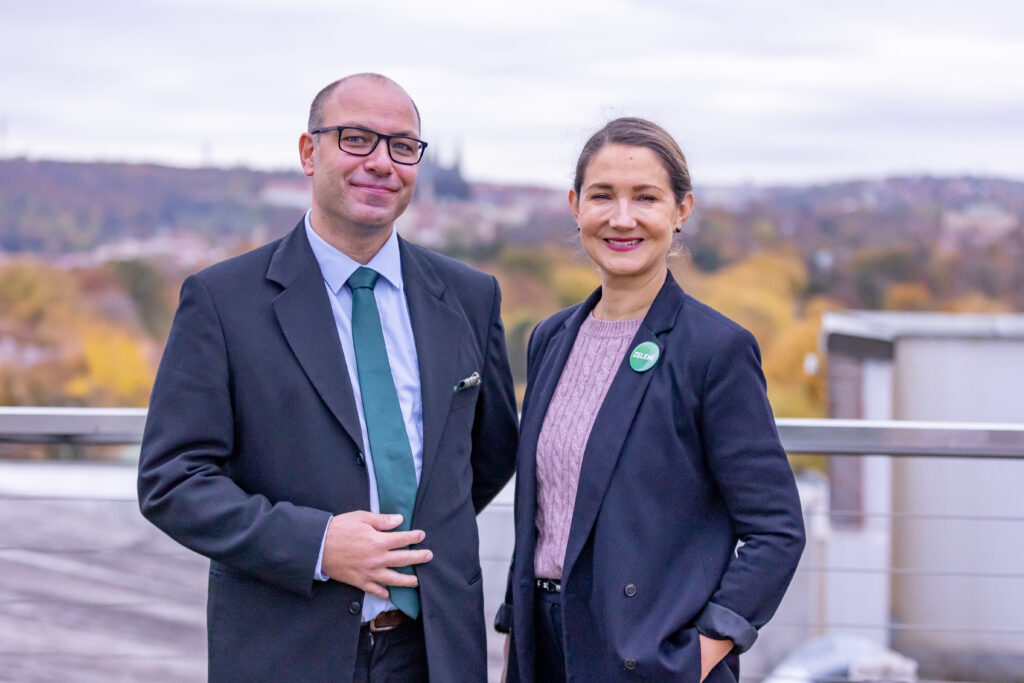
Foto: Zeleni
As of February 2025, the Green Party (Strana zelených, SZ) does not hold any seats in the 200-member Chamber of Deputies of the Czech Parliament. The party last held parliamentary representation following the 2006 elections, where it secured 6.29% of the vote and obtained six seats.
General Politics: Founded in 1990, the Green Party is a political entity in the Czech Republic that emphasizes environmental issues, social justice, and human rights. The party gained prominence in the mid-2000s, particularly after leading environmental activists and former dissidents joined its ranks post-2002. This shift contributed to the party’s success in the 2006 elections.
Political Position: The Green Party is positioned on the center-left of the political spectrum, advocating for green politics, progressivism, and social liberalism. It aligns with the European Green Party and emphasizes policies that promote environmental sustainability, social equity, and human rights.
Voters: The party appeals to voters who prioritize environmental protection, progressive social policies, and human rights. Its support base often includes younger individuals, urban residents, and those with higher levels of education who are concerned about ecological issues and social justice.
Policies: The Green Party’s platform focuses on environmental sustainability, including the promotion of renewable energy sources and the reduction of greenhouse gas emissions. It advocates for social justice initiatives, such as equal opportunities in education and the protection of minority rights. The party also emphasizes the importance of transparent governance and active citizen participation in political processes.
Perception on Corruption: The Green Party positions itself as a proponent of transparent and ethical governance. It has advocated for anti-corruption measures and policies aimed at increasing accountability within public institutions, aligning with its broader commitment to social justice and the rule of law.
In Government: Following the 2006 elections, the Green Party entered the governing coalition led by Prime Minister Mirek Topolánek. During this period, the party held ministerial positions and influenced policies related to environmental protection and education. However, internal conflicts and external political pressures led to a decline in support, and the party failed to secure seats in subsequent parliamentary elections.
Recent Developments: In the 2024 European Parliament elections, the Green Party, led by Johanna Nejedlová, received 1.55% of the vote, which was insufficient to secure representation. The party continues to engage in environmental advocacy and grassroots initiatives, aiming to rebuild its support base and reestablish a presence in both national and European political arenas.
Overall, the Green Party remains committed to promoting environmental sustainability, social justice, and transparent governance in the Czech Republic, despite facing challenges in recent electoral cycles.
